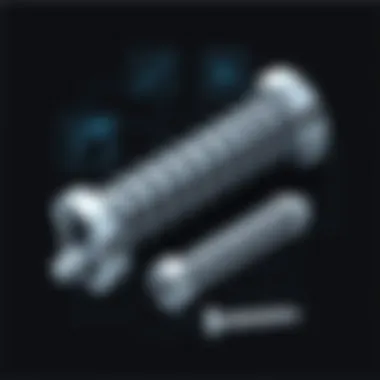Comprehensive Guide to Stainless Steel Machine Screws


Intro
Stainless steel machine screws form the backbone of countless applications ranging from the assembly of electronic gadgets to complex machinery. These fasteners aren’t just hardware; they are essential components that provide stability and durability in multiple environments. Knowing the ins and outs of stainless steel machine screw assortments helps both amateurs and seasoned professionals make confident choices in their projects.
As we delve into this article, we’ll peel back the layers surrounding machine screws—what they are, their critical features, and how to choose the right assortment for your needs. We won't just scratch the surface; we'll explore specifications, best practices, and tips to optimize their usage in various scenarios. From tech enthusiasts building custom PCs to engineers designing intricate systems, understanding these fasteners is a crucial step to ensuring the longevity and efficiency of their projects.
Preamble to Stainless Steel Machine Screws
When tackling any project, be it assembling a simple electronic gadget or a complex machinery system, one of the most often overlooked yet vital components is the machine screw. Understanding stainless steel machine screws is not just about knowing their types or sizes; it extends into appreciating their material properties, durability, and suitability for specific applications.
Stainless steel machine screws offer a unique blend of attributes that make them preferable in numerous contexts. For starters, their corrosion resistance is paramount, especially in environments where moisture or harsh chemicals may come into play. This characteristic ensures that the integrity of the assembly is maintained over time, avoiding failures that could arise from rust or degradation. Moreover, the mechanical strength of stainless steel aids in sustaining heavy loads without failure, which is crucial in settings where reliability is non-negotiable.
Additionally, machine screws come in diverse types and styles, catering to different fastening needs. You’ve got socket head cap screws, flat head screws, and many others, each serving distinct purposes and offering unique advantages. For enthusiasts delving into complex assembly projects, distinguishing between these specifications can make or break a project’s success.
Consider the following significant aspects when working with machine screws:
- Material Quality: Choosing the right grade of stainless steel can dramatically affect corrosion resistance and strength.
- Thread Design: The configuration of threads directly impacts how well a screw will hold in materials, which is especially important in precision assemblies.
- Head Type: The shape of the screw head determines how it can be driven into the material, thus affecting the installation process.
Understanding these elements creates a foundational knowledge that is irreplaceable for tech enthusiasts and professionals alike. As you navigate the world of stainless steel machine screw assortments, this introduction sets the stage for making informed choices that enhance both functionality and efficiency in your applications.
"An informed choice in screw selection is the bedrock of a successful assembly process."
In summary, grasping the essentials of stainless steel machine screws is not only beneficial but crucial for anyone engaged in technical fields or hobbyist activities. Whether you're tightening the last screw on a gaming rig or implementing a critical component in industrial machinery, this knowledge will aid you in securing quality outcomes.
The Importance of Material Choice
Choosing the right material for stainless steel machine screws is not merely an afterthought; it's a top priority that holds considerable weight in every application. When selecting screws, you have to think about where and how they’ll be utilized, as these factors greatly influence the choice of material. The benefits of using stainless steel are manifold, offering versatility that is hard to beat, yet understanding the material's properties is essential for anyone delving into the world of fasteners.
Corrosion Resistance Properties
Corrosion resistance stands as one of the shining stars in the stainless steel lineup. Thanks to the addition of chromium, which forms a passive layer of chromium oxide, stainless steel screws can fend off rust in ways that other materials simply cannot match. This is especially key in areas exposed to moisture or corrosive environments.
For example, the automotive sector often uses stainless steel in parts that face various weather extremes. It can save a mechanic from a world of headaches down the line.
When you think about corrosion resistance, consider the local climate and environmental factors. For instance, marine environments present unique challenges where saltwater can wreak havoc on fasteners not made from top-notch materials. Stainless steel provides reliable performance in such situations. This property greatly extends the life of screws and reduces maintenance frequency, leading to overall cost savings over the project lifecycle.
Mechanical Strength and Durability
Mechanical strength is another aspect you can’t overlook. Stainless steel, as a material, offers impressive tensile strength, allowing screws to bear heavy loads without bending or breaking. This robustness comes in handy across various applications, including construction and heavy machinery. When compared to other materials, stainless steel stands firm, reducing the risks of failure, which is critical in structural applications.
Moreover, durability is inherently tied to mechanical strength. For instance, selecting the right grade of stainless steel can enhance longevity under tension. Some alloys can resist higher levels of stress and strain without compromising integrity. By choosing a screw with proper mechanical properties, you pave the way for long-lasting performance.
In essence, the choice of material impacts not just the immediate functionality of a machine screw but also the longevity and reliability of the entire assembly.
To sum it up, understanding the importance of material selection isn’t just about technical specifications; it’s about the bigger picture in your projects. Whether in tech, automotive, or construction, aligning the right material with the needs of the application creates a sound foundation for success. By making informed choices about the materials, you empower both your designs and your practical implementations.
Types of Stainless Steel Machine Screws
Exploring the different types of stainless steel machine screws is a crucial aspect in understanding their utility and application across various fields. Ideal for anyone involved in tech industries, from electronics to automotive, these screws are not just fasteners; they embody a harmony of strength, versatility, and reliability. Knowing the nuances between the various types provides a clear advantage in selecting the right fasteners for specific needs. Let's delve deeper into four prominent types of machine screws that are commonly employed in practical applications.
Socket Head Cap Screws
Socket head cap screws are characterized by their cylindrical head and hexagonal drive. This design affords several benefits, particularly enhanced torque capabilities during installation. Using an Allen wrench or hex key, users can impose significant force, which is especially critical when dealing with high-strength applications. These screws come in various sizes and materials, offering flexibility for a multitude of projects.
In environments where space is limited, the recessed design allows for a compact fit, making them ideal for machinery and high-performance applications. Moreover, socket head cap screws generally possess exceptional tensile strength due to their cold-formed construction. This means they provide a sturdy grip without the usual concerns over screw stripping.
"Socket head cap screws are a favorite among engineers because they can handle hefty loads while being user-friendly."
Pan Head Screws
Pan head screws have a rounded head that provides a larger surface area for load distribution. They work admirably in situations where pressure needs to be spread across a relatively wide area. Whether it’s in sheet metal applications or securing electronic components, screwing down with pan head options can help maintain both integrity and aesthetic of surfaces.


For tech enthusiasts, it's worthwhile to note that pan head screws are easily recognized and visually appealing when completing a project. Being available in various materials and finishes, they can blend seamlessly into any assembly. You can expect great usability when pairing these screws with flat or curved surfaces alike.
Flat Head Screws
Flat head screws come with a conical shape, allowing them to sit flush against the surface once installed. This design prevents snagging or catching against the surface, making them suitable for applications where a smooth finish is paramount. In the construction of electronics or hardware where space is limited, flat head screws can ensure that the components fit snugly without protruding too much.
Functionally, they can help distribute load evenly, reducing the risk of damage to the material. This characteristic makes them popular in woodworking, computer hardware, and even outdoor applications where wind resistance is a factor. Opting for flat head screws can provide a clean and polished look while maintaining strong connections.
Button Head Screws
Button head screws are similar to pan head screws but with a distinctly larger, rounded head. They offer a unique aesthetic and are often used in applications where visual appeal matters. Not just for looks, their design also promotes easier handling. Generally equipped with a larger contact area, button head screws distribute loads effectively while enhancing engagement with the driven tool.
Consider using button head screws in gaming rigs or custom builds. They can add a touch of flair to a project while maintaining the necessary strength to hold it together securely. Plus, their moderate resistance to stripping, thanks to their size, makes them a smart choice for repeated adjustments.
Understanding the variety of stainless steel machine screws and their distinguished characteristics enables informed decision-making. In a world where precision and quality matter, knowing the right type can greatly enhance the performance and longevity of a project.
Key Specifications to Consider
When it comes to selecting stainless steel machine screws, paying attention to the key specifications can make all the difference. These specifications can influence the performance, durability, and effectiveness of your fastener in a range of applications. Knowing what to look for can help one avoid common pitfalls and ensure that the fasteners used are ideal for the task at hand.
Thread Pitch and Diameter
Thread pitch and diameter are crucial parameters. They are often the first specifications buyers consider when selecting screws, and rightly so. The thread pitch refers to the distance between threads, which affects how tightly screws can be secured. For instance, a finer thread pitch may allow for a more secure fit, especially in softer materials, while a coarser pitch can be easier to drive into harder substrates.
When assessing diameter, the size will significantly impact the load-bearing capacity of a screw. Larger diameters typically distribute loads better, making them suitable for structural applications. It’s key to match the thread pitch and diameter not just with the material, but also with the screw's intended use. Each application, be it electronic assemblies or automotive components, has its own unique requirements.
Tip: If unsure about which combination to choose, consider referring to standard classifications or even engineering guidelines. This approach ensures that your selection aligns with industry standards, which often reflect best practices and tested methods.
Another significant aspect to remember is that the standardization of thread types, such as UNC (Unified National Coarse) or UNF (Unified National Fine), can also play a pivotal role. Each type has its advantages and contextual use cases, so understanding which to choose based on your project requirements is beneficial.
Length and Head Style
Length and head style are other key specifications that can influence the overall performance of stainless steel machine screws. The length of a screw determines how far it can penetrate materials. Selecting a screw that is too short for your specific application can lead to inadequate fastening, while a screw that is excessively long might protrude unnecessarily and cause various complications during assembly or use.
The head style adds another layer of intricacy to the selection process. Options like hex, pan, or flat head screws serve different purposes and offer various aesthetic and practical benefits. Hex head screws, for example, provide a better grip for tightening and loosening, while flat head screws enable flush installation with surfaces.
Here's a brief look at some common head styles:
- Hex Head Screws: Offer a larger face, providing a solid grip for torque applications.
- Pan Head Screws: Have a rounded top which is often preferred for aesthetic qualities in visible applications.
- Flat Head Screws: Ideal for flush installations, they end up hidden beneath the surface.
- Button Head Screws: Similar in function to pan heads but with a more significant dome, offering a stylish touch in exposed applications.
Ultimately, both length and head style can dramatically affect how the screw interacts with the material and the overall mechanics of the assembly. Therefore, understanding and considering these specifications meticulously is critical to achieving optimal results in your projects.
Application Areas for Stainless Steel Machine Screws
Understanding where stainless steel machine screws fit into various industries is key for tech enthusiasts, gamers, and computer builders. These fasteners are not merely functional; they are indispensable in ensuring quality, safety, and performance across an array of applications. When you select the right screw assortment tailored to specific needs, it can make all the difference in the execution and longevity of your projects.
Electronics and Hardware
In the electronics domain, precision and reliability are paramount. Stainless steel machine screws play a crucial role here, often working behind the scenes to hold everything together. For instance, consider the assemblies in laptops or smartphones. Using the right type, like socket head cap screws, enhances stability, preventing hardware issues and improving thermal management by reducing the friction between components. Some benefits of utilizing stainless steel in this area include:
- Corrosion resistance that protects delicate circuits from moisture damage.
- Strength-to-weight ratio helping maintain a lightweight profile without compromising durability.
- Aesthetic appeal, as polished screws can lend a sleek finish to visible aspects of hardware.
Automotive Industry
The automotive sector has distinct demands where machine screws are concerned. The screws used must withstand vibrations, extreme temperatures, and corrosive environments found in various parts of vehicles. For instance, using pan head screws in assembly lines allows quick installation, which optimizes production efficiency. Key considerations include:
- High tensile strength ensuring that parts like engine components remain secured under stress.
- Resistance to rust from exposure to fuel and other chemicals, which is vital for longevity.
- Specialized designs that integrate easily into the complex systems of modern vehicles, from chassis to engine layouts.
Construction Sector


In the construction industry, stainless steel machine screws stand out for their robustness. They are widely employed for fastening structural elements, roofing materials, and fixtures. Choosing the right assortments impacts not only the projects' durability but also safety. Notable elements include:
- Durability in harsh conditions which is essential in both residential and commercial builds.
- Ease of installation with various head styles like flat head screws that lay flush with surfaces, resulting in a more completed look.
- Adaptability to different materials, such as wood, metal, and concrete, ensuring versatility according to project needs.
In summary, the application areas for stainless steel machine screws span crucial industries such as electronics, automotive, and construction. Their roles are centered around quality, reliability, and efficiency, making them essential for anyone working in these fields. Upon mastering the choices available, enthusiasts can significantly enhance the outcomes of their projects.
Selecting the Right Assortment
Choosing the right assortment of stainless steel machine screws is a task that should not be taken lightly. The effectiveness of your whole project can hinge on this choice, so it’s essential to understand the various aspects involved. Selecting an appropriate set comes with a set of benefits, key considerations, and specific elements you must keep in mind. A well-chosen assortment can save you time and frustration during installation while ensuring long-lasting performance.
Understanding Your Needs
Before diving into the vast ocean of stainless steel machine screws available, spend some time to analyze your specific project requirements. This can mean looking at the kind of materials you’re working with, environmental factors, and even the type of load your screws will need to bear.
For instance, if you’re building a component for an outdoor application, you’ll want to pick screws with excellent corrosion resistance to withstand the elements. On the flip side, if your project deals with heavy machinery, then durability and mechanical strength are your top priorities.
A fundamental method to clarify your needs is by answering these questions:
- What materials are involved? Knowing whether you’re working with wood, plastic, or metal can guide your choice significantly.
- What kind of environment will it face? Outdoor projects need different considerations compared to indoor ones. Rust and corrosion can be rapid outdoors, so choose accordingly.
- What loads will the screws need to handle? It’s critical to ensure that the screws are robust enough for the application you have in mind.
Assessing Quality and Certification
Once you have a solid grip on your needs, the next step is to consider the quality and certification of the screws you’re looking to purchase. Not all screws are created equal, and a reliable supplier will have the necessary certifications that speak to their standards.
A few quality markers to ponder include:
- ISO Certifications: Ensure the manufacturer adheres to international quality standards. This often indicates a commitment to continual improvement and consistent quality.
- Material Specifications: Look for specific grades of stainless steel, such as A2 or A4, which indicate different levels of corrosion resistance and strength.
- Test Reports: Some suppliers provide testing results that show how their screws perform under pressure, temperatures, and other conditions. These reports can help you make an informed decision.
It’s wise to source your screws from trusted platforms to ensure there are no surprises. Checking reviews and engaging with other tech enthusiasts or industry forums can also guide you in understanding the best products in the market. Be open to asking questions or seeking recommendations; these practices can lead to discovering hidden gems that other builders have had success with.
"The right choice today can prevent a lot of headaches tomorrow. Understanding your needs and investing in quality pays off in the long run."
By focusing on understanding your unique requirements and evaluating the quality of available options, you’ll be well on your way to assembling a collection that is both practical and effective for your intended application.
\n
Best Practices for Usage
When it comes to stainless steel machine screws, employing best practices during both installation and maintenance is crucial for achieving optimal performance and extending their lifespan. Understanding these practices not only promotes proper use, but it also helps in avoiding common pitfalls that can lead to failures. Let's delve into the specifics.
Proper Installation Techniques
Installing stainless steel machine screws correctly is an art. If done haphazardly, it can render the screws ineffective, or even worse, lead to mechanical failures down the line. Here are a few pivotal points to consider:
- Tightening Torque: It’s vital to apply the right amount of torque. Over-tightening can strip the threads or damage the workpiece, while under-tightening can lead to loosening over time. Consult the specifications provided by the screw manufacturer to find the ideal torque range.
- Alignment: Always ensure that screws are aligned properly with the corresponding holes. Misalignment leads to uneven stress distribution and can compromise the integrity of the joint. A bit of patience during this step can save you a world of trouble later.
- Washers: Consider using washers when installing screws, especially in applications involving vibration or expansion. Washers help distribute the load evenly and prevent damage to the surfaces being fastened.
- Cleaning Before Installation: Any contaminants on the threads, such as grease or dirt, can mess with the screw’s grip. Simple cleaning with a lint-free cloth can go a long way in ensuring a secure fit.
"Proper installation is half the battle won."
Maintenance and Longevity
Maintenance is often the unsung hero in the lifespan of stainless steel machine screws. While these screws are renowned for their durability, neglecting maintenance can lead to premature failure. Here are some practical tips:
- Regular Inspections: Periodically check for any signs of corrosion or loosening. It's easy to overlook this, but a little vigilance can prevent bigger problems later. Inspect not just the screws but the materials they're installed in as well.
- Cleaning: If your machine screws are located in areas prone to exposure, especially outdoors, a simple wash with mild soap and water can keep corrosion at bay. Dry them thoroughly afterward to prevent any moisture accumulation.
- Lubrication: While not always necessary, applying a light lubricant on the threads can help in easy disassembly in the future and can reduce wear over time. Just make sure to choose a lubricant compatible with stainless steel to avoid chemical reactions.
- Replace When Necessary: Even with diligent care, screws may still need replacement over time. Look out for signs of fatigue or wear and replace them when needed to keep your machinery functioning smoothly.
By focusing on proper installation and regular maintenance, you ensure that your stainless steel machine screws will serve their purpose effectively, helping to keep your projects running without a hitch.
Common Misconceptions
When it comes to stainless steel machine screws, the landscape is fraught with misconceptions that can lead to poor choices and unexpected issues in various applications. Understanding these fallacies is crucial for anyone looking to incorporate these fasteners into their projects. The nuances behind these misunderstandings can significantly affect performance, durability, and overall satisfaction with the final product.


A common misconception is that all stainless steel is created equal. This sentiment can cause a flurry of problems. For one, it overlooks the fact that stainless steel comes in different grades, and each is engineered for specific environments and uses. An individual might believe that opting for a lower-grade stainless will suffice for a high-stress application, which could lead to catastrophic failure down the line. Differentiating between the grades is essential, as each carries unique properties involving tensile strength, corrosion resistance, and overall wear resistance. While 304 stainless is apt for general-use applications, 316 might be preferable for marine or highly corrosive situations.
"Not all heroes wear capes, and not all stainless steel is suitable for every job."
Another misconception revolves around the nature of corrosion resistance. Some assume that simply using stainless steel screws guarantees that they'll never rust. However, even the best grades can corrode under specific conditions. Environmental factors such as exposure to moisture or chlorine-rich substances can lead to a phenomenon known as pitting corrosion. This type of corrosion occurs when the protective oxide layer on the stainless steel surface begins to break down, exposing the metal beneath to the elements. It's crucial to keep in mind that proper care and selection of the right screws, taking their environment into account, is fundamental to maintaining their integrity.
Differences Between Stainless Steel Grades
Stainless steel offers various grades, each tailored for specific applications. Knowing these distinctions allows for informed decisions when selecting machine screws. Here’s a quick breakdown:
- 304 Stainless Steel
This is the most commonly used grade and is favored for its general corrosion resistance and formability. It's fine for indoor use or in environments not heavily in contact with harsh substances. - 316 Stainless Steel
Highly resistant to corrosion and pitting, this grade is ideal for marine applications or environments rich in chemicals. If your screw will see the ocean or any similar chemicals, this is the way to go. - 410 Stainless Steel
A martensitic stainless steel with great strength but much lower corrosion resistance. It's often used for applications where polishing is needed.
Being clued up on these grades and their unique attributes can make a noteworthy difference in your project's success. As a gamer or tech aficionado, selecting the right screw could mean the difference between a rugged, reliable build and a flimsy machine that falls apart after a few months.
Misunderstandings About Corrosion Resistance
When thinking of corrosion resistance, it’s easy to fall into the trap of believing that all stainless steel is impervious to rust and corrosion, but that is far from the truth. Various grades of stainless steel possess different resistance capabilities, and external factors can interfere. People may not be aware that elements such as saltwater, acids, or pollutants can dramatically diminish the lifespan of a stainless steel screw. For instance, consider screws used in coastal applications which are bombarded by salty air; these require a much higher grade.
Additionally, maintenance often gets ignored. Frequent cleaning or adding protective coatings can help prolong the life of your stainless steel hardware, especially in demanding environments. Fail to do so, and you might find your screws showing signs of corrosion sooner than anticipated.
Understanding the specific conditions your screws will face in their application can help you select the best material to match your needs. By being aware of the limits of corrosion resistance, you can effectively avoid unexpected disappointment when dealing with stainless steel machine screw assortments.
Epilogue and Final Thoughts
As we wrap up this exploration of stainless steel machine screw assortments, it's crucial to reflect on a few key points that not only underline the significance of these fasteners but also clarify the benefits and considerations that should be kept in mind when choosing them.
First, stainless steel machine screws are more than mere fasteners; they are essential components within a myriad of applications across various industries. Their characteristics, such as corrosion resistance, mechanical strength, and durability, are what set them apart from other types of screws. As discussed, selecting the right screws affects not just the integrity of the assembly but can also influence the longevity of the equipment or product.
When considering your options, one must weigh the different types of screws available. Whether you're leaning toward socket head cap screws for their robustness or pan head screws for their versatility, each type offers unique advantages suited to particular applications. It's a matter of aligning the screw type with your specific needs to ensure optimal functionality.
Additionally, don't overlook key specifications like thread pitch, diameter, and length. These factors may seem trivial at first glance but are instrumental in achieving a perfect fit. Miscalculating these measurements can lead to inefficiencies during installation or, worse, structural failures in your builds. Ensuring you understand your needs and the standards applicable provides a solid foundation for making informed decisions.
Another important aspect highlighted is the common misconceptions surrounding stainless steel grades and their corrosion resistance capabilities. Awareness and understanding in this area can spare you from costly mistakes, ensuring you choose the right material suited for your environment and specific use cases.
Lastly, as you navigate through the purchasing process, it’s essential to engage with reputable suppliers and ensure that the products meet quality certifications. When in doubt, refer to industry standards and guidelines. Resources like Wikipedia and Britannica can help broaden your understanding of standards within this hardware space, while forums on Reddit could provide valuable insights from other enthusiasts and professionals who have gone down this road before.
Further Reading and Resources
Understanding the landscape of stainless steel machine screw assortments is more than just knowing what types are available or how to select them. It's about diving deeper into the standards, regulations, and trusted sources that govern the use of these fasteners in various industries. Further reading and resources can substantially enhance your knowledge, providing insights that are critical for anyone, whether a hobbyist or a seasoned professional.
When selecting materials, practices, or suppliers, having well-founded information can significantly improve the quality of your projects. The right resources ensure that you're not only making informed decisions but also adhering to industry standards that prioritize safety and efficiency. Here’s a closer look at some vital elements to consider:
Industry Standards and Guidelines
In the realm of machine screws, industry standards serve as the backbone for quality and safety assurance. Understanding these guidelines is vital for those working with these fasteners in important applications such as electronics or automotive manufacturing. Organizations like ASTM International, the American National Standards Institute (ANSI), and International Organization for Standardization (ISO) develop these standards, dictating everything from dimensions to tensile strength requirements.
The importance of adhering to these standards includes:
- Quality Assurance: Following established guidelines ensures that the stainless steel screws used meet the appropriate specifications for strength and corrosion resistance.*
- Compatibility: Using screws that conform to specific standards guarantees compatibility with existing assemblies and parts, minimizing development delays or mechanical failures.
- Regulatory Compliance: In many industries, adherence to these standards is mandated by law. This helps mitigate liability and boost consumer trust.
For a deeper dive into the specifics, resources like ASTM.org and ISO.org offer comprehensive databases of standards specific to fasteners. Further exploration into these guidelines can lead to enhanced knowledge and improved installation practices.
Recommended Suppliers and Manufacturers
Finding the right supplier or manufacturer is as crucial as knowing the types and specifications. A reputable source not only provides quality products but also helps establish a long-term partnership that can influence the success of your projects.* Here are a few standout manufacturers worth considering:
- McMaster-Carr: Recognized for its dramatic range of fasteners, their catalog is a go-to for professionals.
- Fastenal: Offers a wide selection of industrial and construction materials, including stainless steel machine screws with robust customer service.
- Grainger: A well-known distributor that stocks a range of hardware and provides extensive product information, making it easier to make the right choices.
When selecting a supplier, consider assessing their track record, customer reviews, and product certifications. Opt for suppliers who are transparent about the specifications of their products and willing to offer support.
To wrap things up, diving into further reading and resources about stainless steel machine screws isn’t just a good idea - it’s essential. Knowing the standards and having trusted suppliers can keep your projects running smoothly and avoid costly mistakes. So, whether you’re piecing together a new project or conducting routine maintenance, equip yourself with the right knowledge and connections.*
"Investing time in understanding the resources available can significantly impact the success of your projects in the long run."
For additional insights, check out resources like Wikipedia.com, MetalFormingMagazine.com, or industry forums on Reddit.com.



